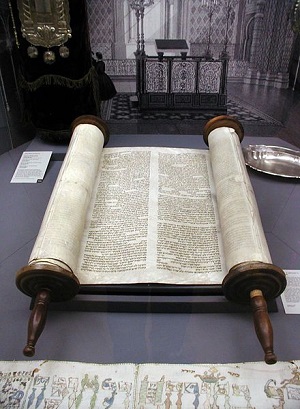
Sefer Torah at old Glockengasse Synagogue (reconstruction), Cologne. Photo: HOWI - Horsch, Willy (eigenes Foto (Zeughaus)) via Wikimedia Commons
In a fascinating Talmudic narrative in Gittin 56b, we are told that Rabbi Yohanan ben Zakai, outstanding leader of the Jewish people during the days in which the Roman Empire invaded the land of Israel, was confronted with a question of life and death. Vespasian, who would soon become the new Roman emperor, had brought the Jews to total exhaustion after years of intensive battles. Jerusalem had essentially fallen, people were dying, there was little to eat and complete despair had overtaken the Jewish community. At any moment, the Temple would be destroyed and only one question remained. Do the Jews surrender and save whatever could be salvaged, or do they fight until the death without any hope or future?
Rabbi Yohanan made a crucial decision which would save Judaism for centuries to come and signal a great message to all future Jews. His disciples hid him in a coffin, smuggled him out of the besieged city of Yerushalayim and brought him to the future emperor Vespasian. Rabbi Yohanan informed him that the Jews were willing to surrender, on one major condition: “Give me Yavne and its sages.” The city of Yavne was the center of Jewish learning and the seat of an outstanding rabbinical court.
What Rabbi Yohanan understood was that, contrary to other nations, the issue of Jewish survival was not dependent on the possession of the land of Israel, nor on an army, but rather on an identity and an ideology. Although Rabbi Yohanan did not deny the importance of the land of Israel, he knew that Jews could continue to be a people even without a land. It would be dangerous and far from ideal. But if needed, it would work.
However, it required a most unconventional move which would turn the Jewish people on its head. Instead of being a land- and Temple-centered people, Rabbi Yohanan realized that Jewish life needed to be focused on communal Torah study and synagogue prayer. Synagogue prayer and regular Torah readings had already been introduced by Ezra at the beginning of the Second Commonwealth. This would allow the Jewish people to carry this portable identity, in the form of the Biblical text, into the lands of exile. As long as the Jews kept studying this Biblical text, the Jewish people would not cease to exist.
But Rabbi Yohanan ben Zakai realized that this was insufficient. What was necessary for Israel’s survival was the Torah’s encounter with day to day life – to put Torah study at the center of Jewish life. Unlike the great academies of Greece, it was not the theoretical study which the sages of Yavne would cause to prevail. Rabbi Yohanan fully understood Greek philosophy which was truth thought but not always truth lived. By giving the sages of Yavne the opportunity to continue their studying and teaching, Rabbi Yohanan knew that these eminent scholars would ensure that what they taught was also lived. As the British historian Paul Johnson writes in his History of the Jews, with Rabbi Yohanan ben Zakai Judaism became a cathedocracy (rule of the scholars). The living Torah became the home and fortress of faith. The integrity of the sages of Yavne guaranteed that Jews would never succumb to moral bankruptcy. It was not philosophy which they imparted - but life; not faith taught, but faith lived.
Shavuot is, therefore, not just the celebration of the giving of the Torah 3,400 years ago, but also the commemoration of Rabbi Yohanan’s heroic deed and foresight on the eve of the destruction of the Second Temple. His terms for surrender turned out to be the key to subsequent Jewish survival, allowing a downtrodden and dispersed nation to return home nearly two thousand years later. He simultaneously sent a message to all future generations that the real key to our spiritual survival is our ability to maintain our uniqueness throughout the diaspora. Our secret weapon in resisting assimilation and the cultural influence of our enemies was the Torah - our “portable identity”.
*Based in part on R. Nathan Lopes Cardozo, “Rabbi Yohanan ben Zakai and the Portable Fatherland,” http://www.cardozoacademy.org/thoughts-to-ponder/shavuoth-ttp-113/.
Rabbi Aryeh A. Frimer is the Ethel and David Resnick Professor Emeritus of Active Oxygen Chemistry at Bar Ilan University; Aryeh.Frimer@biu.ac.il.
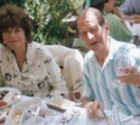 The Ottensoosers
The Ottensoosers Advertisers Directory 190
Advertisers Directory 190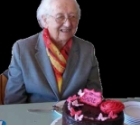 Milestones 190
Milestones 190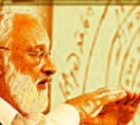 Kabbalah For All
Kabbalah For All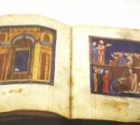 Haggadot
Haggadot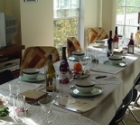 Passover 5767 ...The Holiday of Freedom
Passover 5767 ...The Holiday of Freedom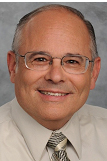 Aryeh A. Frimer
Aryeh A. Frimer